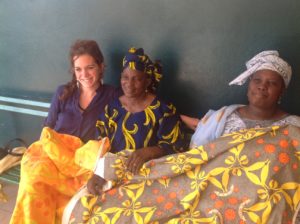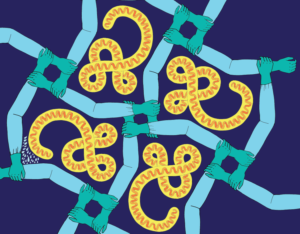GAIA Vaccine Foundation’s Story-Telling Cloth receives “Grand Challenges Explorations Grant” Award For West African-Style “Social Media” Cervical Cancer Prevention Campaign
Providence, Rhode Island, 04 November 2014. The Bill and Melinda Gates Foundation awarded $100,000 to GAIA Vaccine Foundation to test whether dissemination of a printed cloth that tells the story of HPV, coupled with a media campaign led by influential women musicians, will improve HPV knowledge and incite women to be screened for cervical cancer and (when vaccine is available) to vaccinate their daughters against HPV in West Africa. Cervical cancer is one of the most common and lethal cancers (67% mortality) among women in Africa, with rates that are approximately 5 fold higher than in the US. Nine out of ten (87%) cervical cancer deaths occur in less developed regions of the world, like Mali. This exceptionally high rate of cervical cancer is almost entirely due to lack of knowledge about HPV, since at least in Mali, cervical cancer screens are free and available at every health center.

GAIA Vaccine Foundation Executive Director, Eliza Squibb, with Mme Rokia Sangare and Madame Fatoumata Diarra showing off the HPV “story-telling cloth” design at the Hope Clinic, a project funded by the foundation in Bamako, Mali.
Gates Foundation is funding the innovative idea that story-telling ‘Pagnes’, a traditional cloth worn by most women in West Africa, can motivate women to be screened for cancer while making use of fashion to disseminate cervical cancer education. Previous research by GAIA Vaccine Foundation uncovered a very low rate of knowledge about the association between HPV and cervical cancer in Mali [https://bit.ly/HPV_Mali]: less than 3 in 100 persons were aware of the connection between HPV and cervical cancer, and cervical cancer testing rates were extremely low. “If you don’t know the connection, you have no motivation to get tested” said Annie De Groot MD, GAIA Vaccine Foundation’s Scientific Director. And you certainly won’t vaccinate your daughter against HPV infection, which has been shown to prevent cervical cancer. “These life-saving tests and vaccines are already available in the US and Europe, and it is about time that they were available to West African women too”. De Groot is also known as an award-winning “Vaccine Influencer” (one of the top 50 vaccinologists in the world, according to a recent poll): https://bit.ly/Vaccine_Influencers_2014.

New Ebola-Story-Telling Cloth Design for Ebola – this one and two others are being considered. Vote for your preferred design on the GAIA VF website: https://www.gaiavaccine.org/story-telling-cloth-for-ebola/
A few years ago, she had a flash of inspiration about using brightly printed cloth or ‘pagnes’, which are worn throughout Sub Saharan Africa to tell the about the connection between HPV and preventing cervical cancer. A creative student at Rhode Island School of Design (RISD), Eliza Squibb, contributed the eye-catching design, and the result is West African ‘pagne’ (colorful printed cloth) that tells the story of HPV-associated cervical cancer, its transmission, HPV vaccination, and how getting screened for cervical cancer could prevent death from the disease. Dr. De Groot stated: “We are extremely grateful to the Bill and Melinda Gates Foundation for funding this project. We plan to follow expand the distribution of this cloth throughout West Africa. Producing it locally will create jobs for local businesses and tailors in Mali, and the fashion ‘buzz’ about the cloth will successfully transmit this message to women at risk of cervical cancer”.
At a recent focus group in West Africa Eliza Squibb, the artist who is now the GAIA Vaccine Foundation Executive Director, met with enthusiastic women and men who were all ready to wear the cloth. One man made the cloth into a shirt by the next day! (see pictures). Eliza Squibb, GAIA Vaccine Director and artists, said that designs are in the works for Ebola, HIV and TB. For more information about the cloth and the GAIA Vaccine foundation, visit https://www.GAIAVaccine.org. To donate to GAIA VF and support this project, and others like it, interested persons are invited to visit https://www.globalgiving.org/donate/1196/gaia-vaccine-foundation/. GAIA’s Story-Telling Cloth© In West Africa, textiles have traditionally served as a medium of communication, and a method of storytelling.
Created by artist Eliza Squibb, who is also GAIA Vaccine Foundation’s Executive Director, GAIA’s pattern tells the story of strong, educated women who proclaim, “I protect myself, I take care of myself, and I immunize myself”, a mantra written as a banner across the image of flowering, healthy cervixes. Nearly disguised in the beautifully vivid print are the images of fallopian tubes and uteruses surrounding a near-invasion of HPV viruses embedded in abnormal cancerous cells. These are banners serve to remind women about ways to keep the virus out of the healthy cervixes, a reminder of the importance of being an educated, vaccinated woman. Under separate GAIA Vaccine Foundation funding, each woman who receives the HPV vaccine will receive a pagne, the traditional length of printed fabric for dress-making, so that she might pass on the story of prevention and vaccination, and take on a personal role in preventing cervical cancer. A pilot project to introduce HPV vaccines to Mali is underway, funded by GAVI.
About GAIA Vaccine Foundation
The mission of GAIA Vaccine Foundation (GAIA VF) is Global Vaccine, Global Access. GAIA promostes Education, Prevention, Access to Care and Vaccines for infectious diseases affecting developing world countries. GAIA’s partner, EpiVax Inc., is developing a ‘globally relevant” HIV vaccine that would be available at no cost to developing world countries. Dr. Annie De Groot, who is internationally known for her work on epitope-driven vaccines, serves as CEO and CSO of EpiVax, Inc. She was also recently named the Director of the Institute for Immunology and Information at the University of Rhode Island, is carrying forward preclinical studies of the GAIA HIV/AIDS vaccine.
Since the development of a globally relevant, globally accessible vaccine is years away, GAIA VF also coordinates HIV education, prevention and access to care programs in Providence and Bamako, working to stop HIV until a vaccine is developed. In keeping with these objectives, GAIA VF has built the Hope Center Clinic, an HIV treatment center located in Sikoro, Mali.
Sikoro is one of the poorest neighborhoods of Bamako, the capital city of one of the poorest countries in the world, and consequently has very high HIV prevalence when compared to the rest of the city. The HIV care is provided in a CSCOM, or lowest rung on the clinical ladder of state-run clinics in Mali. The Hope Center Clinic was the first ‘village-based’ clinic for improving universal access to HIV care in West Africa.
GAIA VF has also provided access to mother to child HIV transmission prevention at the Hope Clinic’s “Chez Rosalie” prenatal care center for the past five years. The Hope Center is a model for future HIV clinics, as it currently serves tens of thousands of people who previously had little to no access to HIV testing and treatment. Expansion of the GAIA VF CSCOM “Hope Clinic” model of village-based HIV treatment and prenatal HIV testing and MTCTP to the 700 CSCOMs in Mali (and to similar village-based clinics throughout Africa) is one of several universal access interventions supported by GAIA vaccine foundation, that is expected to reduce HIV transmission in the next five years.
Cervical Cancer caused by HPV in West Africa
The link between HPV and cervical cancer is well known and well documented. Merck and GSK have developed vaccines to prevent cervical cancer; these vaccines are already preventing the disease in the US and in Europe. Access to cervical cancer detection “pap” smears is practically nonexistent in West Africa, where the vaccine-preventable disease is the number one cause of cancer death among women. HPV vaccination will begin in many sub Saharan countries in the next few years, but vaccine acceptance will require education. Thus in preparation for the vaccine campaign in hardest hit areas of the world, GAIA Vaccine Foundation is promoting awareness through a fashionable print that is an effective and culturally appropriate way of joyfully transmitting information about an important pubich health campaign. For information on HPV in West Africa, see: https://www.GAIAVaccine.org/HPV. For more information, on GAIA Vaccine Foundation see https://www.GAIAVaccine.org. For information about Eliza Squibb, artist and designer of the Story Telling Cloth, see https://www.gaiavaccine.org/hpv-project/. For information about Annie De Groot MD, please see either the article about De Groot on the Smith College website or De Groot at EpiVax. For information on the iCubed see. https://www.immunome.org/.

